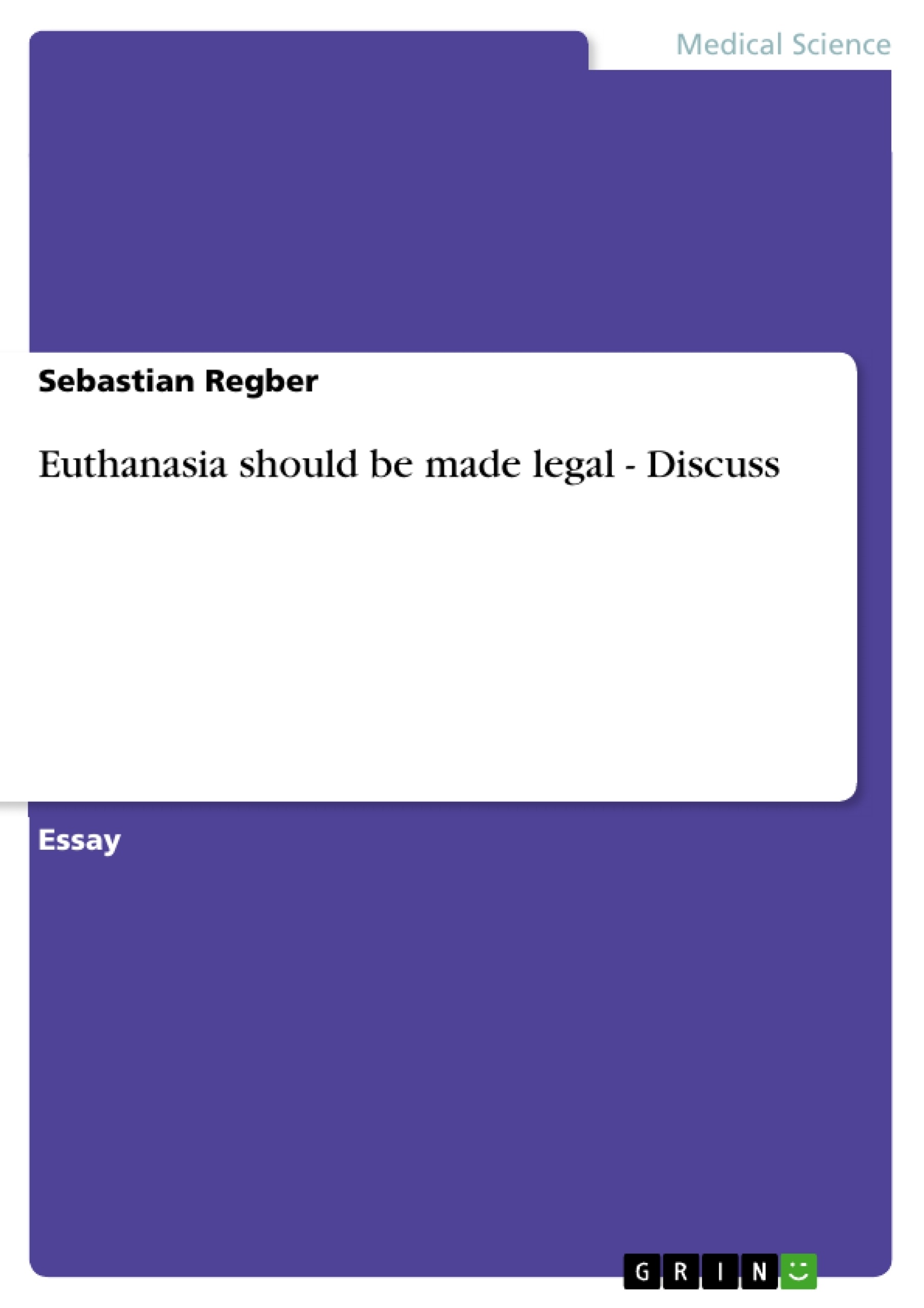It exists is no clear-cut answer to the question of whether euthanasia should be made legal or not. “Euthanasia is the deliberate killing of a person who is very ill and going to die, in order to stop them suffering.” Since it became legal in Netherlands, Belgium, Oregon and Washington, there has been existing a lot of debate about this bioethical topic. The following essay will discuss at first all arguments supporting legalisation of euthanasia. Then, there will be offered the arguments in contra. The author will conclude by stating that euthanasia should not be made legal, because of too much gaps in law leading to misuse.
Table of Contents
- Arguments in Favor of Legalizing Euthanasia
- Arguments Against Legalizing Euthanasia
Objectives and Key Themes
This essay aims to explore the arguments for and against legalizing euthanasia. It analyzes the ethical and practical implications of this complex issue.
- The alleviation of suffering for terminally ill patients.
- The potential for misuse and abuse of euthanasia laws.
- The role of medical professionals in end-of-life decisions.
- The economic implications of euthanasia.
- The inherent value of human life.
Chapter Summaries
Arguments in Favor of Legalizing Euthanasia: This section presents arguments supporting the legalization of euthanasia, primarily focusing on the relief of unbearable pain and suffering for terminally ill individuals. It emphasizes the patient's autonomy and right to choose a peaceful death rather than endure prolonged agony. The argument highlights that prolonging life against the patient's wishes is inhumane and contradicts ethical medical practice. Examples are given, such as situations where a patient is in terrible agony and death is imminent; in these cases, ending suffering is presented as morally justifiable.
Arguments Against Legalizing Euthanasia: This section counters the arguments for legalization, emphasizing the potential for misuse and the difficulties in defining "terminal illness." The essay points out that the legal definition of "terminal" is ambiguous, and medical professionals cannot always accurately predict life expectancy. Further, it argues that cost containment in healthcare could become a driving force behind euthanasia, leading to undue pressure on vulnerable individuals. The risk of misdiagnosis is also highlighted as a significant concern, emphasizing the need for multiple expert opinions before such a decision is made. The inherent value of human life is also discussed as a counter-argument.
Keywords
Euthanasia, assisted suicide, end-of-life care, palliative care, medical ethics, bioethics, suffering, autonomy, cost containment, misdiagnosis, legal implications, human life.
Frequently Asked Questions: A Comprehensive Language Preview on Euthanasia
What is the purpose of this document?
This document provides a comprehensive preview of an essay exploring the arguments for and against legalizing euthanasia. It includes a table of contents, objectives and key themes, chapter summaries, and keywords.
What are the main arguments in favor of legalizing euthanasia?
Arguments in favor primarily focus on alleviating unbearable suffering for terminally ill patients. It emphasizes patient autonomy and the right to choose a peaceful death rather than prolonged agony. The argument posits that prolonging life against a patient's wishes is inhumane and contradicts ethical medical practice.
What are the main arguments against legalizing euthanasia?
Arguments against legalization highlight the potential for misuse and abuse, difficulties in defining "terminal illness," and the risk of misdiagnosis. Concerns are raised about the ambiguity of defining "terminal," the potential for cost containment to drive euthanasia decisions, and the inherent value of human life.
What are the key themes explored in the essay?
Key themes include the alleviation of suffering, the potential for misuse of euthanasia laws, the role of medical professionals in end-of-life decisions, the economic implications of euthanasia, and the inherent value of human life.
What are the chapter summaries?
The chapter summaries detail the arguments for and against legalizing euthanasia. The "Arguments in Favor" section focuses on relieving suffering and respecting patient autonomy. The "Arguments Against" section emphasizes the potential for abuse, difficulties in defining terminal illness, and the inherent value of human life.
What are the keywords associated with this topic?
Keywords include: Euthanasia, assisted suicide, end-of-life care, palliative care, medical ethics, bioethics, suffering, autonomy, cost containment, misdiagnosis, legal implications, human life.
What is the overall objective of the essay?
The essay aims to explore both sides of the debate surrounding euthanasia, analyzing the ethical and practical implications of this complex issue.
- Quote paper
- Sebastian Regber (Author), 2009, Euthanasia should be made legal - Discuss, Munich, GRIN Verlag, https://www.grin.com/document/128100



